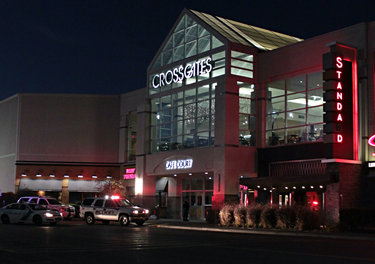Retail-sector shutdown places Pyramid in a payment pretzel
— Enterprise file photo
The COVID-19 pandemic has been the source of unprecedented economic turmoil since it first began, causing the economy to contract by nearly 5 percent in the first three months of the year while turbocharging the deepest decline of retail sales in general and clothing sales in particular since records have been kept.
GUILDERLAND — Accounting for 5 percent of the American economy, retail is at once mired in a decade-long decline while, right up until last month, it also enjoyed the longest economic expansion ever recorded.
Since 2010, due in part to the rise in online shopping and growth of club-style big-box stores, dozens of retailers have declared bankruptcy, shutting tens-of-thousands of brick-and-mortar stores in what’s been called a “retail apocalypse.”
The COVID-19 pandemic has now poured gasoline on the fire, forcing an estimated 190,000 retailers to close, some of whom have very publicly decided not to pay rent for the time being — a decision that has been felt locally.
With retail tenants not paying rent, “a large number” of commercial landlords have already missed mortgage payments, according to the commercial real estate analyst firm Trepp.
Pyramid Management Group, the owner of Crossgates Mall, missed its most recent mortgage payment on a $388.5-million loan for its Palisades Center mall in West Nyack in Rockland County.
The loan was then transferred to a special servicer due to “imminent monetary default,” the Rockland County Business Journal reported in April.
In the commercial mortgage-backed securities (CMBS) industry, a special servicer assumes responsibility of a loan from its original administrator, known as a master servicer, when the borrower has “defaulted mortgage loans or loans that are designated as ‘specially serviced’ as a result of credit events,” according to the Practising Law Institute.
The Palisades-affiliated CMBS loan was just one of six Pyramid loans to have been moved to special servicing recently — most expensive among them are two loans associated with Crossgates.
Revenue, one way or another
The coronavirus pandemic shrank the American economy by 4.8 percent in the first quarter of 2020, and nowhere was that impact felt harder than in retail and food-services sales, which dropped 8.7 percent between February and March, a decline more than double the previous record decrease of nearly 4 percent that took place during the Great Recession, between October and November 2008.
The decline of retail and food services sales, from $529.3 billion to $483.1 billion, “was almost equal in a single month to the $49.1 billion peak-to-trough decline that unfolded over 16 months in the Great Recession,” according to Reuters.
Clothing sales were eviscerated, declining by half between February and March, from about $22 billion to about $11 billion, by far the deepest decline since the government first began keeping records, in 1992. The retail sector’s unemployment rate went from 3.9 percent in April 2019 to 17.1 percent in April of this year.
And malls, once home to so much retail that they couldn’t be put up fast enough, have either become blights or have had to adjust their entire business models to adapt to the new normal — with so much over-building, it’s expected that one in four malls will be closed by 2022.
Crossgates Mall in recent years has eschewed traditional retail in favor of restaurant and entertainment venues. In June 2017, up to 20 percent of Crossgates’ space had been dedicated to enterprises other than retail sales.
The trend at the time was to offer mall-goers experiences that, unlike retail goods, can’t be purchased online. In June 2017, e-commerce purchases accounted for 9 percent of all retail sales; as of the fourth quarter of 2019, the most recent available data, online purchases accounted for 11.4 percent of all retail sales, according to the Federal Reserve Bank of St. Louis.
And seeking to diversify beyond retail, Pyramid has hopes of building an apartment complex in Guilderland. Michael Shanley, a Pyramid partner, told The Enterprise in November 2019 that Crossgates had, for many years, been focused solely on retail, but that the market is changing and the company is looking for other alternatives.
Adapting to a new normal
Albany County Executive Daniel McCoy during his daily coronavirus update on May 7 highlighted a letter he had sent to Congress — in his capacity as county executive, as president of the New York State County Executives Association, and as president of the County Executives of America — about the need for more federal money to help fight the COVID-19 pandemic.
The last thing McCoy wanted to do was to raise taxes on homeowners, he said, he didn’t want to place that added burden on residents as the county tries to reopen amid a new normal, in a COVID-restricted state.
McCoy said Albany County was spending a lot to fight the virus, but the problem had become compounded because being shut down is also costing the county a lot in tax revenue, which it uses to keep property taxes among the lowest in the state.
But part of the new normal is the uncertainty of future revenue among the county’s largest sales-tax generators, with Colonie Center currently closed. “Pyramid Mall a couple of weeks ago filed for bankruptcy,” McCoy said of the owner of Crossgates Mall, which is also closed. “So these are things that are going to be the new norm,” he said, “and you’re going to see a lot of restaurants doing the same thing.”
To that end, McCoy highlighted the need to help the county’s small businesses, the “backbone of our community,” he said, to support them in this new environment.
Pyramid in a statement to The Enterprise said, “[It’s] unsupported speculation that Pyramid is actively planning to file for bankruptcy is simply false.”
In April, Moody’s announced that it had placed five of the 17 tranche payouts in the Crossgates-affiliated CMBS on review for downgrade, “[the] action reflects [Moody’s] expectations of increased risk of default and cash flow deterioration among loans backed by property types that are most susceptible to the coronavirus pandemic’s impact on travel and consumption as well as damage to the broader economy.”
This month, “as a result of the COVID-19 pandemic,” Crossgates and its current $105 million loan (the company carries a separate $157.6 million loan as well) was identified as a “Loan of Concern,” by the Kroll Bond Rating Agency (KBRA), which also noted the mall is “experiencing a decline in occupancy and net cash flow.”
Two of six
A bank creates a commercial mortgage-backed security by taking a group of its income-producing commercial property loans (for example, a mortgage on a mall held by a property-management group), whether entirely its own pool of loans or going out buying additional ones, bundles them together, and sells them as securitized bonds. Securitization takes an illiquid asset, something that can’t be quickly or easily sold, a mall, for example, and transforms it into an easily bought and sold financial instrument like a stock or bond.
The issue with having a CMBS loan default or “designated” to a special servicer is that, unlike in a traditional lender-borrower relationship, “the special servicer is not concerned with the borrower’s position,” according to a working paper co-authored by professors from state universities of Pennsylvania and Arizona. Instead the special servicer “may undertake actions that maximize the position of” investors with whom the servicer has monetarily-aligned in order to “guarantee the timely cash flow payments to [that investor].”
Since the coronavirus outbreak started, 5,420 borrowers whose $100.7 billion in loans are pooled in commercial mortgage-backed securities have reached out to “their loan servicer to explore potential relief,” according to Fitch Ratings; the loans account for “17 percent of the $583.8 billion of the CMBS universe.”
Fitch reported that non-payment from tenants and government-mandated business closures are hardships often cited by loan borrowers, whose most common requests for relief include payment forbearance and reserve reallocation in order to service debt.
Pyramid’s Crossgates and Palisades loans are just two of six Pyramid loans that have recently been transferred to special servicers.
Also in April, Pyramid transferred $430 million in loans associated with its Destiny USA Mall in Syracuse, which has been closed since the outbreak, to its special servicer, requesting a six-month debt-service deferment and to be able to use its reserve operating expenses, according to KBRA.
In placing the Destiny-associated commercial mortgage-backed securities on a watch downgrade, Kroll noted it had “considered the continued declines in operating performance since last review and the transfer of both the underlying loans to the special servicer, coupled with the potential for additional stress on cash flow and value owing to the COVID-19 economic disruption.”
Kroll also raised concerns about Pyramid’s ability to refinance or extend the loans due to their impending maturity, on June 6.
The Bond Buyer reported this week that the Destiny Mall shutdown had “put Pyramid at further risk of defaulting on [its] $430 million in commercial mortgage-backed security loans,” which were due to mature in March 2019.
But the loans were transferred to the special servicer.
According to Trepp, the special servicer, Wells Fargo, at the time of the transfer wrote in a commentary, “The two loans were transferred due to an imminent payment default that ‘is not likely to be cured’ before the loan matures,” which they were not and Wells Fargo extended them.
Pyramid’s remaining troubled loans cover malls on either side of the state.
Located in Erie County, in western New York, Pyramid’s loan on the Walden Galleria Mall has a remaining balance of $247.8 million.
Kroll placed the Walden-affiliated CMBS bond on watch downgrade in April, stating the “loans transferred to the respective special servicers [were] due to imminent monetary default,” and that Pyramid had “requested debt service deferment and other relief due to impacts related to the COVID-19 pandemic.”
The original loan for Walden Galleria was $270 million when it was issued in 2012; at maturity, Pyramid is on the hook for a $236.7 million balloon balance, which is a standard CMBS-loan feature.
A typical CMBS loan is short-term in that the borrower only has a five- to 10-year loan term; however the monthly payments made by the borrower are set up as if he or she is paying off a standard 30-year loan.
So, for example, with a 5-year loan that is amortized, spread out equally, over 30 years, a borrower is doing little more than covering the interest on the loan and not putting a dent in the principal, leaving himself or herself with a 25-year mortgage payment that comes due at the end of five years.
The longer the amortization, the less principal that is required every month to pay back the loan, which means more money in someone’s pocket. And a single CMBS bond contains dozens of these mortgages, so what happens is every month the interest received from these loans is pooled and paid out to bond holders.
The final Pyramid loan that was transferred to special servicing in April because of an imminent default was the remaining balance of a $77 million loan (originally, $85 million) the company has on its Poughkeepsie Galleria in Dutchess County.




What an excellent and informative article, so much research. Very concerning and not unexpected situation. Thank You !